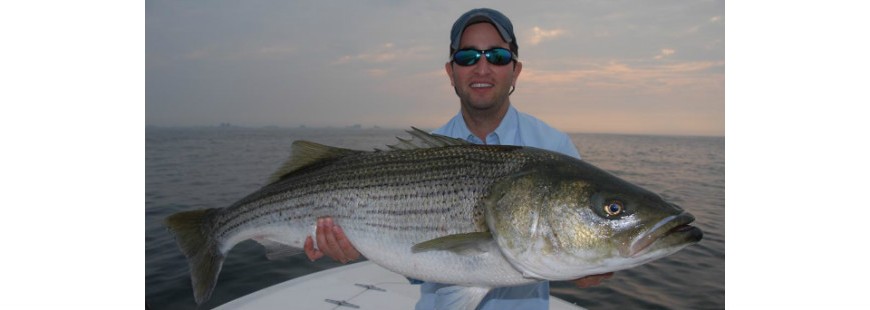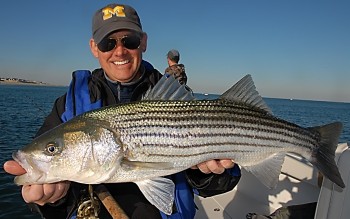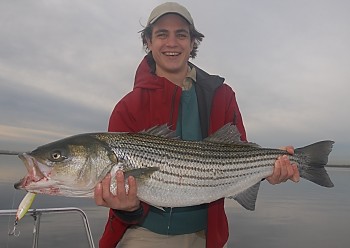Opening Up Federal Waters off Montauk/Block Island to Striped Bass Harvest is Another Bad Idea
These days, even the most novice striped bass anglers understand that harvest of striped bass in “federal” waters (from three miles out to 200) is against the law.
Such area has been designated as the Exclusive Economic Zone (EEZ). It’s been closed to striped bass fishing since 1990, when a federal moratorium was put in place to protect new year classes entering the spawning population and to help with the rebuilding of a resource recovering from a couple of decades of overfishing.
Yet, I feel like only recently do people get it. That’s likely do to several broadly publicized enforcement actions, some of which were quite serious, as well as outreach by the Coast Guard and NOAA Fisheries and the advent of, ehm, online bloggers yapping about it.
In 2006, NOAA Fisheries re-evaluated the federal ban. After receiving approximately 8,500 comments, almost all supporting a continued closure, the agency decided to maintain the moratorium to ensure fishing pressure did not increase. Today it effectively serves as a badly need buffer for an adult striped bass population. Outside of three miles, stripers are temporarily protected from the sometimes immense pressure they face in state waters.
Yet, there are some states that would absolutely like to see federal waters off their coast open to striped bass fishing, particularly Virginia and North Carolina, where a large portion of the striped bass stock overwinters. New York is not without blame; in 2012 and then again this summer, bills were introduced in Congress to open federal waters between Montauk Point, Block Island and Point Judith.
The EEZ is clearly delineated on nautical charts and GPS maps, which indicate a boundary that lies three miles off of relevant points of land in those three states. Because Block Island is approximately nine miles from Rhode Island, and fourteen miles from Montauk Point, there is a large swath of water between Montauk, Block and Pt. Judith — approximately 155 square miles — that is indeed federal water. And, well, just about every serious angler knows that such water, usually from June to October, holds A LOT of striped bass. Generally large ones, too.
While it is legal to be in possession of striped bass in such “transit zones,” while steaming between Block Island and Montauk or other nearby ports — a revision made in 2005 — anglers may not actively fish for stripers in such area. However, if the most recent bill, HR 3070: EEZ Clarification Act, were to pass, recreational fishing for striped bass would be allowed in the “transit zone.”
“So what, we’re just opening a small area between points of land,” you might be thinking. But keep in mind, we’re not talking about making a “small” concession here. We’re talking about 155 square miles of what is really prime striped bass habitat, particularly for those older larger, fecund females, in close proximity to some of the biggest recreational and commercial fishing ports on the East Coast.
If such an opening were to occur, A LOT more big fecund females would presumably end up hanging on dock hooks. And assuming you are a surfcaster, or light-tackle/fly-fisher or just a nearshore angler, you’ll continue to be left, rod in hand, scratching your head and wondering what happened to all those blitzes that used to define the Montauk surf.
Now, as far as I know, there has been no biological analysis conducted by NOAA Fisheries, ASMFC or other managing agency of what sort of impact this might have. I mean, that sort of analysis should be a requirement before considering anything like this. But really, I don’t know how it wouldn’t result in a significant increase in overall fishing mortality.
If you are taking the time to read this, I’m guessing you know that things are not exactly “rosy” with striped bass. The stock has been in steady decline since 2006. And while the last assessment found that it wasn’t quite yet overfished, such assessment clearly warned that it very well could become overfished in 2015. The last thing we should be considering at this point is a likely increase in fishing mortality.
Furthermore, any such regional opening would screw up a uniform and consistent EEZ closure along the striper coast. You can be damn certain that if such a law were to pass, MA, VA, NC etc., would be carving out their own preferred areas of the EEZ to open. And there would be justification. “If New York can do it, then we should be able to also.”
And while the EEZ was closed to commercial striped bass fishing pursuant to an executive order issued by President George W. Bush, it’s not unreasonable to think that any an EEZ opening might initiate an effort to allow commercial fishing in federal waters, too.
Finally, as Charlie Witek points out in a recent blog post, HR 3070 is, well, kinda silly…. The bill intends to open up areas landward from “a continuous line running from a point 3 miles south of the southernmost point of Montauk to a point 3 miles south of the southernmost point of Block Island, Rhode Island, and from such point 3 miles south of the southernmost point of Block Island, Rhode Island, to a point 3 miles south of the southernmost point of Point Judith.”
Uhm, if you get a chart out and actually draw those lines, you’ll see that it cuts off the entire southeast corner of Block Island. That means that technically, if you were to be fishing from the beach at, say, Sand Bank, or Cat Rock, you’d be doing so illegally. Not sure how the sponsors of the bill overlooked such a thing, but it clearly points to the lack of thought that went into this thing.
In short, the EEZ moratorium is and has been an important component of striped bass conservation efforts, keeping fishing mortality down, particularly on those older large fish that compose the spawning stock, and appear to frequent federal waters. Such a closure has over the years, without question, helped to protect the striped bass resource.
We should make it clear to our Congressional Representatives that we shouldn’t be messing with it.
The Montauk party/charter fleet is arguing that such a regional opening would provide economic benefits. Perhaps it might. But the larger question is whether such potential economic benefits, for what appears to be a narrow special interest, trump the long-term health of a public resource? And should those fish be available to such special interests at the expense of the great majority of anglers, particularly those surfcasters and near-shore fishermen?
The answer seems pretty simple to me.





I am a charter Captain in Chatham Cape Cod.
The draggers are killing more big Stripers than are reported. Seen them floating. Now as a by catch they can keep 15 I think.
Keep it closed more large stripers are brought to massachusetts from block island every year. Seen fish that had dull eyes all red being sold the day of sale at 5 am while I get ice at the dock. Coolers full licence plates from Rhode Island
I agree with the author, a quick economic benefit for a few Northern Charter and Head Boats, and a long term decrease of biomass for the rest of the East Coast.
I own and operate a Charter Boat out of Cape May NJ. We target Striped Bass 5 to 6 weeks every Fall and Winter. There is currently a viable market for clients and operators. The EEZ helps preserve the species and our jobs.
This year marks the first with heavy enforcement from State and Federal Agencies. I applaud their efforts, and hope the fines are substantial for those that were cited. There are days in South Jersey when hundreds of boats are “across the line” poaching this resource.
Our offspring deserve the right to capture this species too.
Franz Hueber
LIBATION CHARTERS
Catch and release, one hook, no trolling, solves any issue!
It’s interesting that charter captains within the industry would opt for the short-term financial boost over long-term protection of the fish they depend on to make a living. A few years down the road when you can’t produce enough fish to make people want to charter, then you’ll be the first ones bitching that someone should have done something to keep the stocks healthy. I’ve been in the fishing business for over 30 years, and without exception, the best of the best charter captains all push for leaning on the side of caution when it comes to the resource. See, they have seen the ups and downs in the industry, and know well that their house, boat and car payments are dependent on a healthy fishery, so they have the vision to know the fish must be protected now if they’re going to be charter captains in the future.
Keep the eez closed
It’s always better to have a policy of using a resource not abusing it.
As I’ve learned over the years most charter boat captains can’t see past there nose and they want to take take take with out thinking about the consequences of there actions.
Then when the resource dries up there the first saying to the government why didn’t you tell us this would happen with there hands out for federal aid.
I’ll be the first guy to tell these people sorry your the very reason this has happened and keep your hands to your self.
I’m a tax paying American and I’ll be dammed if my tax money goes to give these selfish b$&%#!@s any aid.
Good article John
I agree keep it closed. The ocean fisheries are being decimated in so many other areas. This is one among many that need to managed better. This would just open another door.
Amazing to see so many behave like pump and dump Wall Street scam artists. I’m in it for the long run. My action today matters fifteen years from now.
Do not expect NOAA or ASMFC to come to the rescue if the striper stocks deteriate further. They cater to way too many special interest groups. Keep the EEZ closed!
Pingback: H.R. 3070 Update | Marine Fish Conservation Network
Pingback: ASMFC Striped Bass Advisors to Discuss Opening EEZ on April 21 | Marine Fish Conservation Network
Pingback: Conservation: ASMFC striped bass advisors to discuss opening EEZ on April 21 | Fly Life Magazine
Pingback: Some say let’s take more Striped Bass in the EEZ – Fissues